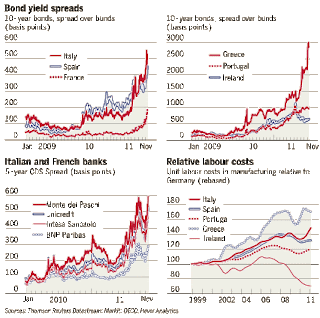En thecorner (blog de la Revista Consejeros, en donde colaboro) Victor Jimenez tiene el post que pueden leer, y del que destaco las palabras de Nordkapp Inversiones (subrayados míos):

... Redundando un poco (machacando incluso). Nick Rowe (al que rindo un pequeño homenaje con su foto) en the-ecbs-internal-contradictions, destacando la esencial contradicción del BCE que ya he desvelado aquí hace tiempo. Pero sigue poniendo la carne de gallina como explica Rowe con claridad lo que sería la caída del euro:
“Sooner than later, we will see Greece out of the euro zone or, if this doesn’t happen, it will be Germany. To prevent this situation, the only recourse would be issuing money, but in order to get the necessary volume to ease the crisis Germany would first prefer to abandon the common currency. The German authorities might accept a short issuance, which would be inefficient enough not to solve the troubles the euro is in. Thus, the euro zone is bound to experience dramatic changes.”
“In any case, the euro has only one direction ahead, and it is downwards. Euro’s fall has somehow been contained so far, but it will accelerate from now on.
“A stubborn Germany prevents the ECB taking the measures that could put the crisis under control. Germany has become the worst enemy of the euro, indeed. Right now, it would be better if a country with more knowledge in finance were in charge of the European Union. Germany is inflicting severe harm to a project it helped so much to create.”
... Redundando un poco (machacando incluso). Nick Rowe (al que rindo un pequeño homenaje con su foto) en the-ecbs-internal-contradictions, destacando la esencial contradicción del BCE que ya he desvelado aquí hace tiempo. Pero sigue poniendo la carne de gallina como explica Rowe con claridad lo que sería la caída del euro:
The ECB's internal contradictions The Eurozone news is really depressing. I think things are going to be very bad very soon. I don't have much to say that I haven't already said in previous posts. But thought I would add this anyway, FWIW.
The ECB doesn't like inflation uncertainty; it wants to keep inflation predictable and just below 2%. The ECB doesn't like buying the bonds of Eurozone governments. The ECB, presumably, wants to preserve the Euro and preserve its own existence.Everything the ECB is currently doing seems almost designed to lead to the exact opposite of what it wants.
The ECB is currently buying limited quantities of Eurozone government bonds. But it has made no public commitment, conditional or otherwise, to do so in future. It doesn't want to buy more.Suppose the ECB made a very public commitment to buy unlimited quantities of the bonds of any Eurozone government, if ever the interest rate on those bonds rose above (say) 5%, conditional on "good behaviour" of those Eurozone governments. If it did that, and also loosened monetary policy more generally, most Eurozone governments would be able to get back to solvency, their bonds would become safe liquid assets, and their bond yields would fall below 5%. (Greece might be an exception). By promising to buy the bonds in unlimited quantities if necessary, the ECB would most likely have to buy none. It could even start selling the bonds it already owns, if it wanted to. (Readers may recognise Chuck Norris making a guest appearance in this post).Given the current ECB policy, what will be the value of the Euro, in terms of goods and services, in (say) two years time? What is the likelihood that it will be anywhere close to 4% ( 2 years x 2% inflation) less than it is today? Very small, in my opinion. If the crisis continues, but by some miracle the Eurozone hangs together, the most likely result will be deflation. If the Eurozone breaks up, many existing Euros will be converted into successor currencies that will depreciate. If the breakup is total, the Euro might even become worthless.Under the existing ECB policy, I'm very uncertain about the future value of the Euro. I'm not even exactly sure how to define the question, when we start talking about successor currencies. If the ECB loosened monetary policy, and also acted as lender of last resort by making a public conditional commitment, the future value of the Euro would be much more predictable, and much closer to the inflation target.Under the existing ECB policy, the Eurozone is coming apart. If the ECB loosened monetary policy, and acted as lender of last resort, it might continue to exist. (Or, at least, allow for a more orderly breakup, which I think would be the better option, though a disorderly breakup is more likely).The ECB is doing everything it doesn't want to do. If you want to go forward, but there's a cliff in front of you, it's best to go backwards and around.






















